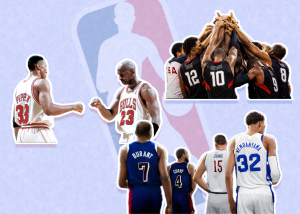The Miramonte “Food Chain” is Harmful to Underclassmen

October 18, 2017
It’s the first day of high school and the incoming freshman are nervously trying to find their classrooms. Little Eddy is an innocent freshman sitting at any regular lunch table with his other little friends until huge football player, Bruce, forces him up from his table to sit there with his other huge friends. While this may seem straight out of a Hollywood movie, “food-chaining” is a problem at Miramonte. Food-chaining is an ongoing “tradition” at Miramonte where upperclassmen take advantage of their age and make underclassmen do favors for them just because they are older. This often happens with sports and finding lunch tables a school.
This activity may sound appealing to upperclassmen because it represents a level of authority that has been earned, but to the younger folks of the school, it is rude and unwanted. “I got food-chained and it was embarrassing,” freshman Lucy Marken said. “It was a bunch of upperclassmen in front of all my classmates. I had to sit next to the trashcan on the ground with the rest of my friends,” Marken said.
Marken was a victim of the food-chaining around Miramonte. “I understand why upperclassmen do it though. It really is an on living tradition even though all freshman despise it,” Marken said.
All of us went through freshman year. We all experienced the kids with facial hair towering over the younglings who just wanted to make it through the first day of school. Freshman are new to the school and need a welcome from the people they look up to, not an awful place to sit on the ground next to the trash can.
Upperclassmen often use food-chaining to their benefit. “The upperclassmen and I often use it in water polo for them to take the covers off or to move the goal cage, but nothing serious at all,” junior Savannah Sherwood said. “I wouldn’t say food-chaining is a problem at Miramonte, but it should be more monitored because I know how it felt when I was a freshman and I got kicked out of my table.” As the tradition lives on, underclassmen should not have to suffer because it may appears as bullying. “Everybody is a freshman at some point, most everybody lives with it and the cycle shall live on,” Sherwood said. In most high school sports, freshmen are often forced to do most of the setup and cleanup of equipment and any other business upperclassmen don’t want to do.
The incoming sophomores are becoming more and more eager to branch away from their “freshman fears”. “I have never been more excited to get promoted up a grade more in my life to get away from the food-chaining in practice mostly. I feel bad for the incoming freshman, but everyone does it so it seems okay,” sophomore Sally fellner said. “Life as a freshman was rough because all the hard work to please the upperclassmen was put onto our shoulders on top of school work.” Being a freshman should be the time to adjust to high school, not the time for upperclassmen to make them feel unwelcome. Fellner plays water polo and as she was food-chained as a freshman at practice, she is excited not to be the youngest and now have the privilege of food-chaining.
We all know how it feels to be a freshman and we all have heard of bullying. Although food-chaining is a tradition that “must live on” to most upperclassmen, the well being of little freshman is far more important.






